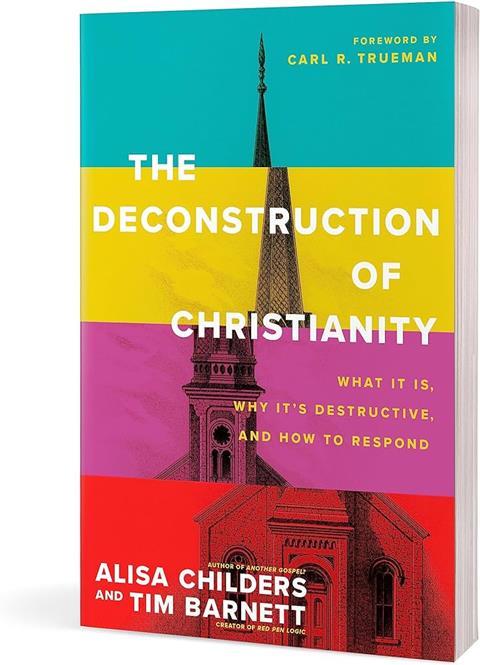Rejecting scripture as the arbiter of Christian belief and replacing it with your own personal judgements is destructive, say the authors of a new book on deconstruction. The fightback is on
There is a lot of confusion and hype around the deconstruction trend in the Church.

Some say that it rejects true Christianity, others believe it’s a healthy process of examining doctrine or rejecting a particular kind of religion that is wrong or harmful.
#Deconstruction is widespread on social media, reflecting its popularity, especially among younger generations. A common partner is #exvangelical, a movement that unites in rejecting evangelicalism, if not Christian faith itself.
Affected people who “no longer identify as Christian” include Derek Webb, former lead singer of Caedmon’s Call, who recently wore a dress at the Christian Dove Awards to be an “ally” to transgender friends. Also Joshua Harris, once-bestselling author of I kissed dating goodbye who now rejects the pro-purity Christian ethics of his book and declares on his website: “I used to have all the answers—chapter and verse. Now I’m happily uncertain, still unfolding, and enjoying the wonder and mystery of life.” There are many others like them.
Although there are many different ways of understanding the term “deconstruction,” Alisa Childers and Tim Barnett’s new book, The Deconstruction of Christianity (Tyndale), compares just two approaches.
The first uses scripture as the judge to question Christian belief and practice, which the authors approve of, believing that it aligns with their Reformed evangelical theology.
The other kind of deconstruction discussed is rejecting scripture as the arbiter of Christian belief and replacing it with a personal, individual judgement of what is right and true, a practice that the book dismisses.
The authors provide a good summary of the problems with deconstructionists’ use of postmodern ideas to interrogate faith, citing leaders in this field such as Neil Shenvi. Postmodernism is inherently contradictory and its corrosive effects of removing the notion of truth and falsehood, good and evil, are seen all around us in society at present. There’s no doubt it needs to be examined and critiqued thoroughly by the Church.
The authors also do a reasonable job of arguing in favour of a scripturally sound, historic faith, and make good suggestions for how churches can improve how they deal with questions from doubters.
The intended audience is conservative evangelical Christians who are concerned about deconstructionism. The authors say they also want to speak to “exvangelicals” themselves with grace, though I’m not sure the book’s tone would appeal to many. For example, the book compares Christians who follow our culture’s new acceptance of homosexuality and transgenderism to Israelites who adopted child sacrifice from their surrounding culture. I understand the point that adopting popular trends can be dangerous, but anyone who considers themselves “exvangelical” might be just a tad offended by comparing the slaughter of babies to a man wearing a dress…
This is also an example of how authors of this book - and perhaps the evangelical Church - are not always addressing the problem as the deconstructionists see it, and therefore might not make much progress in their response. Unlike the Israelites of the Old Testament, a deconstructionist generally uses Western, liberal morals such as tolerance, compassion, acceptance, etc, to judge evangelical theology and its fruits. This lens can itself be justified by scripture and it is Christian in origin.
The authors want to speak to exvangelicals with grace, but their book compares transgender affirming Christians to Israelites who sacrificed their children
What’s more, many deconstructionists have a good point that is not addressed well in this book. If Reformed evangelical theology is correct, and true – why has this branch of the church produced so many unpleasant scandals? Why do so many “exvangelicals” say they grew up in “toxic” environments where conservative theology contributed to an environment where abuse and evil was tolerated? Until there is a better answer than the oft-heard “churches are sinful because people are sinful,” deconstructionists will use negative experiences of church to justify their postmodern theology or their atheism, however contradictory that might be. Evangelicals need to do more soul-searching in this area and pray that they might find the answer to these questions and stop the rot of abuse.
I think it’s more helpful for those who want to defend conservative evangelicalism or traditional Christian ethics to use and examine the “compassion, tolerance” lens that exvangelicals often use on postmodernist ideas themselves. For example, we could ask questions such as: Is it really caring to adopt new sexual morals? What would Christ say about the idea that our sex drives define us – is there a better foundation of our identity? What is the effect on children of a sexualised culture or one that confuses biological genders? Why might it be that our forebears had such a different understanding of sex and its place in society? Are postmodern or non-Christian communities any better at producing non-toxic environments than churches are? Why do new ideas of sexuality and identity seem so good and self-evident in today’s world, but not in other cultures and time periods in history?
If Reformed evangelical theology is correct then why has this branch of the church produced so many scandals?
To even start to answer such questions, approaches like that of Carl Trueman – who wrote a foreword for this book – are needed. His recent work examines the philosophical roots of postmodernism and the rise of identity politics. He has an appreciation of tradition and historic Christianity that is probably necessary to bolster the conservative Christian perspective today.
Another useful avenue is questioning where the compassionate lens that exvangelicals claim to use actually came from. For example, historian Tom Holland has argued that the ideas of supporting the vulnerable or championing rights that are so prevalent among modern progressives and deconstructionists came from Christianity itself. By rejecting the faith, exvangelicals may find that they are cutting off the branch that they are sitting on, and that the “compassionate” lens they use to critique the Church might not survive without Christianity.
This book is clear and well-written, and does a good job of analysing the exvangelical movement from a Reformed standpoint. I’m not so sure about its prescriptions for addressing the phenomenon. But in order to debate the solutions, the Church has to understand the problem, and it is a very complicated one. Therefore, this is a good place to start.
The deconstruction of Christianity: What it is, why it’s destructive, and how to respond by Alisa Childers and Tim Barnett (Tyndale) is out now







































1 Reader's comment